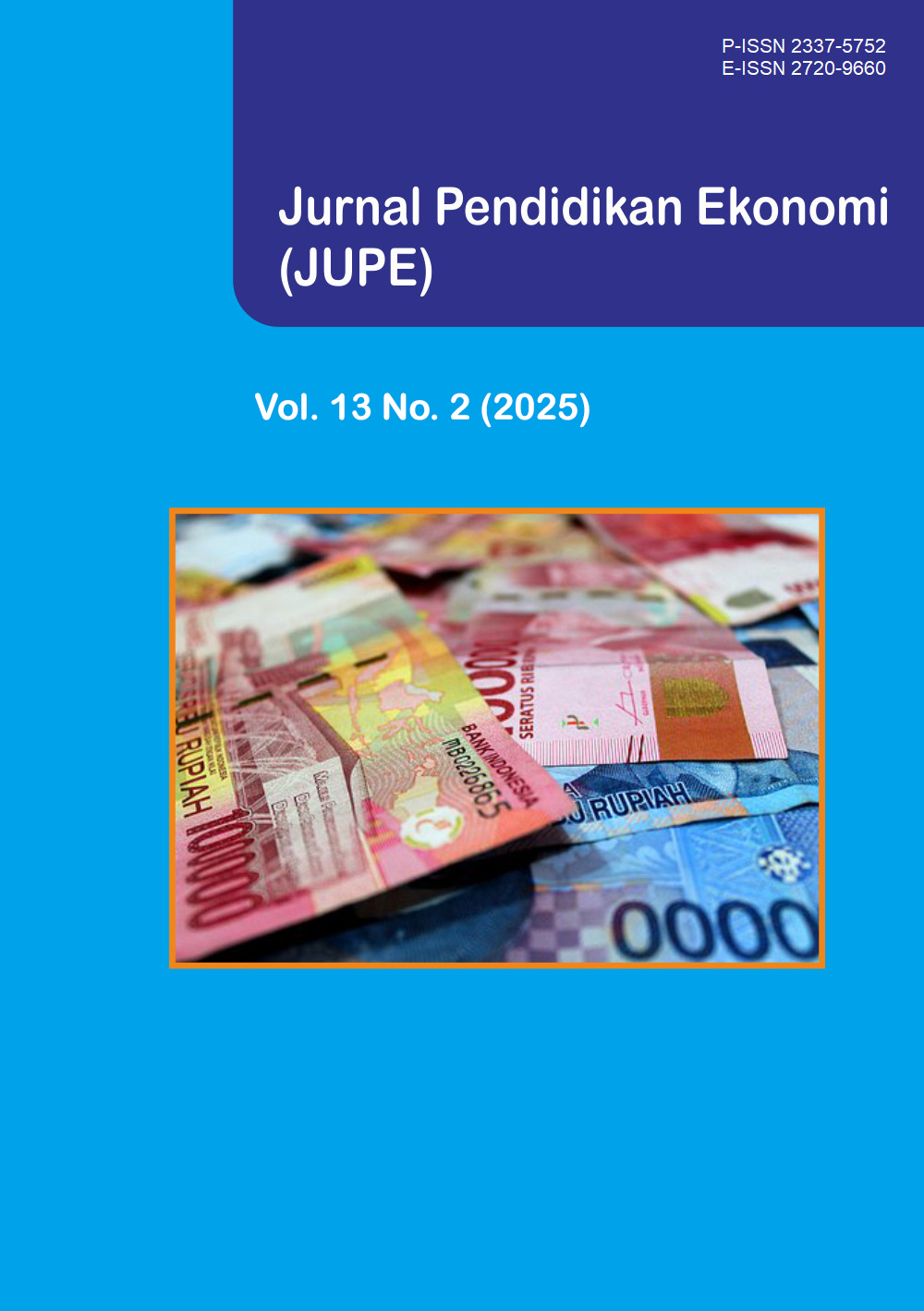Efektifitas peran financial literacy dan financial confidence bagi dosen PTMA di DKI Jakarta dalam meningkatkan financial well-being
DOI:
https://doi.org/10.26740/jupe.v13n2.p91-102Keywords:
Financial Literacy, Financial Confidence, Financial Well-BeingAbstract
This study aims to investigate how knowledge of financial literacy, financial trust impacts financial well-being. Using purposive sampling as many as 100 people. Data collection used online questionnaires distributed at Prof. DR. HAMKA Muhammadiyah University, Muhammadiyah Jakarta University, Muhammadiyah Business Institute, Muhammadiyah University of Science and Technology, Muhammadiyah University of Technology through social media. Data were analyzed using Smart PLS. The results showed that financial knowledge, financial behavior, and financial inclusion have a positive impact on financial well-being. The results of these findings provide important implications for the development of financial literacy education and training programs in the academic environment, as well as encouraging collaboration between educational institutions and financial institutions to improve lecturers' financial knowledge and skills. It is expected that PTMA lecturers can improve their financial well-being by increasing their financial knowledge and confidence. Ultimately, this will have a positive impact on their academic performance and teaching quality. It is hoped that this study will serve as a reference for future research and policy development.
Downloads
References
Ajzen, I. (1985a). From Intentions to Actions: A Theory of Planned Behavior. Action Control, 11–39. https://doi.org/10.1007/978-3-642-69746-3_2
Artha Aulia, F., & Wibowo Adi, K. (2023). Pengaruh literasi keuangan, perencanaan keuangan, dan sikap keuangan terhadap pengelolaan keuangan. Value Added : Majalah Ekonomi Dan Bisnis, 19(1), 1–9.
Ginting, S. O., Perangin-angin, N., & Tiadoraria, L. (2024). Transformasi Financial Behavior Mahasiswa Medan : Peran Financial Literacy , Financial Attitude dan Financial Socialization Agents. 8, 4160–4173.
Gross, J. J., & John, O. P. (2003). Individual Differences in Two Emotion Regulation Processes: Implications for Affect, Relationships, and Well-Being. Journal of Personality and Social Psychology, 85(2), 348–362. https://doi.org/10.1037/0022-3514.85.2.348
Helena, A., & Evelyn. (2024). Pengaruh Financial Literacy dan Self-Control terhadap Financial Well-Being Karyawan Indonesia: Financial Behavior sebagai Mediasi. JEBDEKER: Jurnal Ekonomi, Manajemen, Akuntansi, Bisnis Digital, Ekonomi Kreatif, Entrepreneur, 4(2), 341–353. https://doi.org/10.56456/jebdeker.v4i2.275
I Gusti Ayu Ratih Permata Dewi. (2023). Financial Management Behavior dengan Financial Self-Efficacy Sebagai Variabel Mediasi. WACANA EKONOMI (Jurnal Ekonomi, Bisnis Dan Akuntansi), 22(1), 30–41. https://doi.org/10.22225/we.22.1.2023.30-41
Jamal, H., Haeruddin, H., & Ahmad, I. (2023). Dampak Literasi Keuangan dan Sikap Keuangan Terhadap Perilaku Keuangan (The Impact of Financial Literacy and Financial Attitude on Financial Behavior). Akuntansi Bisnis & Manajemen ( ABM ), 30(2). https://doi.org/10.35606/jabm.v30i2.1277
Laturette, K., Widianingsih, L. P., & Subandi, L. (2021). Literasi Keuangan Pada Generasi Z. Jurnal Pendidikan Akuntansi (JPAK), 9(1), 131–139. https://doi.org/10.26740/jpak.v9n1.p131-139
Lenaini, I. (2021). Teknik Pengambilan Sampel Purposive Dan Snowball Sampling. HISTORIS: Jurnal Kajian, Penelitian & Pengembangan Pendidikan Sejarah, 6(1), 33–39.
Lestari, P., & Mangifera, L. (2023). Peran Financial Literacy Dalam Memediasi Financial Behavior Terhadap Financial Well-Being (Studi E-Wallet Dana). Madani: Jurnal Ilmiah Multidisiplin, 1(10), 391–404.
Lusardi, A., & Streeter, J. L. (2023). Financial literacy and financial well-being: Evidence from the US. Journal of Financial Literacy and Wellbeing, 1(2), 169–198. https://doi.org/10.1017/flw.2023.13
Morris, T., Maillet, S., & Koffi, V. (2022). Financial knowledge, financial confidence and learning capacity on financial behavior: a Canadian study. Cogent Social Sciences, 8(1). https://doi.org/10.1080/23311886.2021.1996919
Nagaveni, R. (2024). Study among Salaried Women in Rayalaseema Region ). 48(4), 2–11.
Netemeyer, R. G., Warmath, D., Fernandes, D., & Lynch, J. G. (2018). How Am i Doing? Perceived Financial Well-Being, Its Potential Antecedents, and Its Relation to Overall Well-Being. Journal of Consumer Research, 45(1), 68–89. https://doi.org/10.1093/jcr/ucx109
Otoritas Jasa Keuangan. (2024). SP OJK dan BPS Umumkan Hasil Survei Nasional Literasi dan Inklusi Keuangan Tahun 2024. 1–6. https://ojk.go.id/id/berita-dan-kegiatan/siaran-pers/Pages/OJK-dan-BPS-Umumkan-Hasil-Survei-Nasional-Literasi-dan-Inklusi-Keuangan-Tahun-2024.aspx#:~:text=Hasil SNLIK tahun 2024 menunjukkan,literasi dan inklusi keuangan syariah.
Palameta, B., Nguyen, C., Hui, T. S., & Gyarmati, D. (2016). The link between financial confidence and financial outcomes among working-aged canadians for the financial consumer agency of Canada. The Social Research and Demonstration Corporation, May, 1–63.
https://www.srdc.org/media/199920/fcac-full-report-on-financial-confidence-en.pdf
Perry, V. G., & Morris, M. D. (2005). Who is in control? the role of self-perception, knowledge, and income in explaining consumer financial behavior. Journal of Consumer Affairs, 39(2), 299–313. https://doi.org/10.1111/j.1745-6606.2005.00016.x
Prasetya, B. P. (2023). the Effect of Financial Literacy on Financial Well-Being Mediated By Financial Behavior. IJEBD (International Journal of Entrepreneurship and Business Development), 6(4), 782–791. https://doi.org/10.29138/ijebd.v6i4.2309
Rahman, M., Isa, C. R., Masud, M. M., Sarker, M., & Chowdhury, N. T. (2021). The role of financial behaviour, financial literacy, and financial stress in explaining the financial well-being of B40 group in Malaysia. Future Business Journal, 7(1), 1–18. https://doi.org/10.1186/s43093-021-00099-0
Restorative, A., Putri, N., & Nur, A. (2023). Penegakan Hukum Pada Kasus Investasi Ilegal Daring. 1(2), 17–27.
Ridwansyah, Y. S., & Anggraeni3, 2; Erike. (2023a). JIMEA | Jurnal Ilmiah MEA ( Manajemen , Ekonomi , dan Akuntansi ). Jurnal Ilmiah MEA (Manajemen, Ekonomi, Dan Akuntansi), 5(3), 494–512.
Ridwansyah, Y. S., & Anggraeni3, 2; Erike. (2023b). JIMEA | Jurnal Ilmiah MEA ( Manajemen , Ekonomi , dan Akuntansi ). Jurnal Ilmiah MEA (Manajemen, Ekonomi, Dan Akuntansi), 5(3), 494–512.
Sajid, M., Mushtaq, R., Murtaza, G., Yahiaoui, D., & Pereira, V. (2024). Financial literacy, confidence and well-being: The mediating role of financial behavior. Journal of Business Research, 182(June), 114791. https://doi.org/10.1016/j.jbusres.2024.114791
Selvia, G., Rahmayanti, D., Afandy, C., & Zoraya, I. (2021). The Effect of Financial Knowledge, Financial Behavior and Financial Inclusion on Financial Well-being. May. https://doi.org/10.4108/eai.3-10-2020.2306600
Setiyani, R., & Solichatun, I. (2019). Financial Well-being of College Students: An Empirical Study on Mediation Effect of Financial Behavior. KnE Social Sciences, 3(11), 451. https://doi.org/10.18502/kss.v3i11.4026
Sjahruddin1, H., Nugroho2, A. P., Litamahuputty3, J. V., & Agustina4, W. (2023). THEORY OF PLANED BEHAVIOR TERHADAP NIAT INVESTASI DENGAN LITERASI KEUANGAN SEBAGAI MODERASI. AT-TAWASSUTH: Jurnal Ekonomi Islam, VIII(I), 1–19.
Sorgente, A., Atay, B., Aubrey, M., Bhatia, S., Crespo, C., Fonseca, G., Güneri, O. Y., Lep, Ž., Lessard, D., Negru-Subtirica, O., Portugal, A.,
Ranta, M., Relvas, A. P., Singh, N., Sirsch, U., Zupančič, M., & Lanz, M. (2024). One (Financial Well-Being) Model Fits All? Testing the Multidimensional Subjective Financial Well-Being Scale Across Nine Countries. Journal of Happiness Studies, 25(1–2), 1–26. https://doi.org/10.1007/s10902-024-00708-z
Syafitri, A. A. (2024). Literasi Keuangan Sebagai Usaha Untuk Mencapai Financial Well Being: Sebuah Perspektif dari Generasi Z.
Dialektika : Jurnal Ekonomi Dan Ilmu Sosial, 9(1), 136–148. https://doi.org/10.36636/dialektika.v9i1.3975
Tasman, A., Fahmy, R., Rahman, H., Ma’ruf, M., & Rahim, R. (2023). Financial Well Being: Suatu Tinjauan Sistematis dan Bibliometrik. Jurnal Inovasi Pendidikan Ekonomi (JIPE), 13(1), 30. https://doi.org/10.24036/011223040
Tiento, J., & Anwar, M. (2023). Pengaruh Pengetahuan Keuangan, Financial Confidence, dan Moderasi Sumber Pendapatan terhadap Perilaku Keuangan Karyawan Swasta. Investasi Dan Syariah (EKUITAS), 5(1), 102. https://doi.org/10.47065/ekuitas.v5i1.3696
Tokar Assad, C. (2015). Financial Literacy and Financial Behavior: Assessing Knowledge and Confidence. Financial Services Review, 24(2), 101–117.
Wijayanti, N., & Kartawinata, B. R. (2023). Pengaruh Financial literacy, Financial confidence, dan Locus of Control Eksternal Terhadap Personal Finance Management. Technomedia Journal, 8(1 Juni), 11–22. https://doi.org/10.33050/tmj.v8i1.1936
YULIANI, Y. (2019). The Effect of Financial Knowledge on Financial Literacy with Mediated by Financial Behavior in Society of Palembang City South Sumatera. Mix Jurnal Ilmiah Manajemen, 9(3), 421. https://doi.org/10.22441/mix.2019.v9i3.003
Yulistiyani, A., Rapini, T., & Setiawan, F. (2023). Analisis Faktor Financial Knowledge, Financial Behavior, Overconfidence, dan Pendapatan terhadap Keputusan Investasi. Jurnal Ilmu Manajemen, 13(1), 41–56. https://doi.org/10.32502/jimn.v13i1.6452
Downloads
Published
How to Cite
Issue
Section
License
Copyright (c) 2025 Egidia Amalia Putri, Andi Amri (Author)

This work is licensed under a Creative Commons Attribution-NonCommercial 4.0 International License.
Copyright
- Authors retain copyright and grant the journal right of first publication with the work simultaneously licensed under a Creative Commons Attribution License that allows others to share the work with an acknowledgment of the work's authorship and initial publication in this journal.
 Abstract views: 200
,
Abstract views: 200
, PDF Downloads: 188
PDF Downloads: 188











